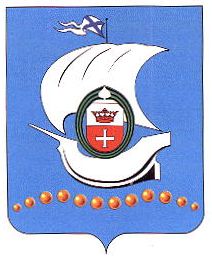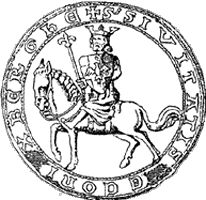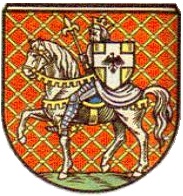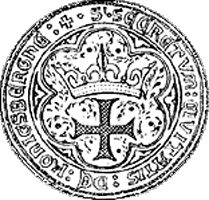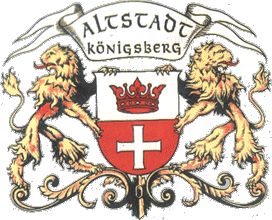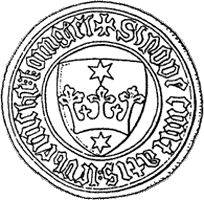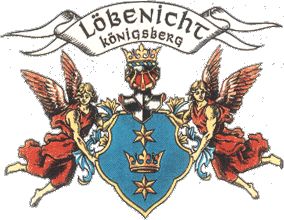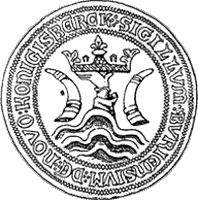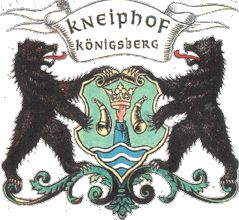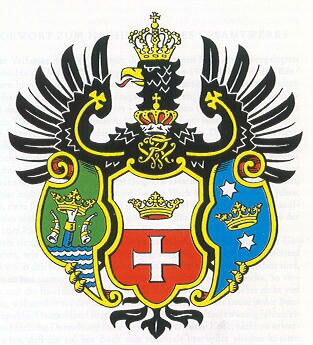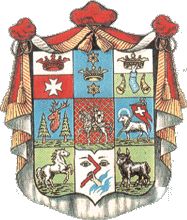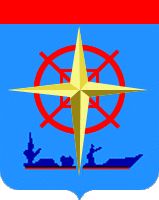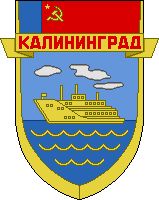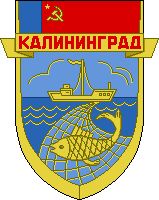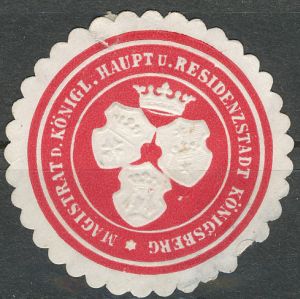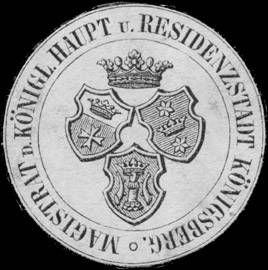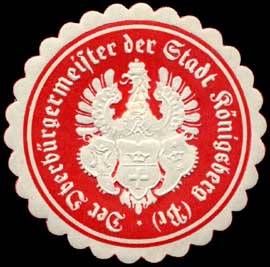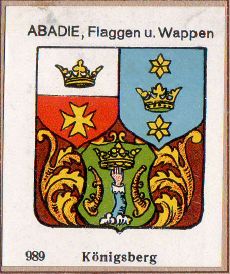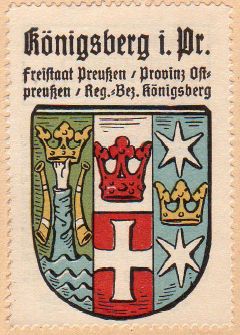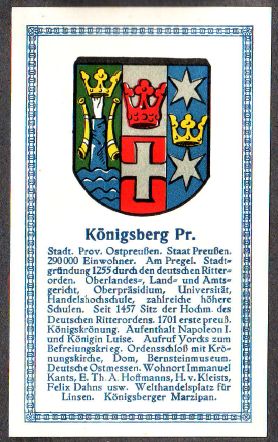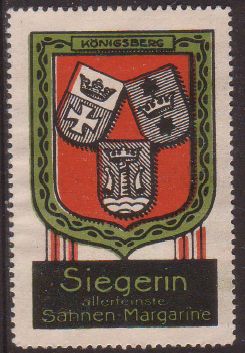Kaliningrad
KALININGRAD (Калининград)
(until 1945 Königsberg)
Federal subject: Kaliningrad Oblast
Origin/meaning
The modern Kaliningrad adopted arms on July 17, 1996, show above. The arms show the old (small) arms surrounded by a ship, indicating the importance as a harbour town. The ship is shown as a Medieval ship, as shipping has been of importance for the town during its whole existence.
Kaliningrad was founded as Königsberg by the Teutonic Knights in 1255, advised by King Ottokar of Bohemia. 1255. They called it after him 'The Kings mount' or 'Königsberg' in German. Around it a city grew that acquired city rights in 1286.
The 'Altstadt' had in the fourteenth century a seal with a knight on horseback, which also appeared on the arms. The knight held a small shield with the arms of the Teutonic Knights. In 1450 a seal appears showing a shield parted horizontally silver and red. The silver upper half shows an open red crown. The lower red half shows a silver cross. The shield is covered with a helmet and two savages act as supporters. The small arms of the city, showing only the shield are shown above left. The crown and cross probably symbolise the King and the Order.
| Seal from the 14th century |
The arms prior to 1450. |
| Seal from the 15th century |
The arms of the 'Altstadt' after 1450 |
In 1300 the nearby village of Löbenicht was raised to a city to and henceforth called 'Neustadt Königsberg' (Neustadt=new city), while the older city was called 'Altstadt'. Löbenicht used since the fourteenth century a blue (sometimes green) shield with a open golden crown, placed between two silver sixpointed stars. The shield is covered with a helmet and two angels act as supporters.
| Seal from the 14th century |
The arms of Löbenicht |
Then in 1327 a settlement on a isle in the Pregel, called 'Knipal', later 'Kneiphof', got the same rights as Altstadt Königsberg. An image from 1327 shows for Kneiphof a shield with an arm raising a crown above two waves with two hunting horns on either side, all on a green background.
| Seal from the 14th century |
The arms of Kneiphof |
The three cities were united in 1724 as Königsberg. Königsberg was the capital of East Prussia until 1945, when it became part of Russia. Ever since the city is named Kaliningrad.
The arms of the three combined cities were sometimes shown together in a single shield, but more often shown separately, with the Prussian eagle as a supporter, see image below and images further below.
| The arms prior to 1945. |
In 1809 under Napoleonic rule, new arms were designed, combining the arms of the three cities, with those of several settlements which were incorporated into the city:
| The arms of 1809. |
The arms show in the upper row the arms of the three cities 'Altstadt', Löbenicht and Kneiphof, in the middle row Tragheim, Königsberg (before 1450) and Sackheim, the lower row Vorderroßgarten, Hinterroßgarten and Neue Sorge.
After the defeat of Napoleon the old arms were restored and used until 1945.
The new city of Kaliningrad did not have proper arms of symbols until 1996, but some 'arms; were used on souvenir badges etc. The firt design was from the early 1950s and not really used by the city, the other two are from the 1980s.
| Proposal from the 1950s | |
| Souvenir badge arms 1980s |
Souvenir badge arms 1980s |
The use of the arms:
| |
Seals from around 1900-1920 |
|
| The arms in the Abadie albums |
The arms by Hupp in the Kaffee Hag albums +/- 1925 |
The arms as seen in the Abdulla-Deutsche Städtewappen album |
| The arms on a Siegerin Margarine trade stamp |
Contact and Support
Partners:
Your logo here ?
Contact us
© since 1995, Heraldry of the World, Ralf Hartemink 
Index of the site
Literature : Hupp, O; 1893; Soboleva, 1998; http://www.heraldicum.ru
